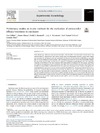Please use this identifier to cite or link to this item:
https://accedacris.ulpgc.es/jspui/handle/10553/69901
| Title: | Preliminary studies on in vitro methods for the evaluation of anticoccidial efficacy/resistance in ruminants | Authors: | Odden, Ane Stuen, Snorre Enemark, Heidi L. Robertson, Lucy J. Molina Caballero, José Manuel Ruiz Reyes, Antonio |
UNESCO Clasification: | 310907 Patología 320505 Enfermedades infecciosas |
Keywords: | Anticoccidial Resistance Bovine Colonic Epithelial Cells Eimeria Spp. In Vitro Assay |
Issue Date: | 2019 | Journal: | Experimental parasitology | Abstract: | Ovine Eimeria spp. infections cause increased mortality, reduced welfare and substantial economic losses, and anticocccidials are important for their control. Recent reports of anticoccidial resistance against ovine Eimeria spp. necessitate the development of in vitro methods for the detection of reduced anticoccidial efficacy, especially since the in vivo methods are both expensive, time consuming and requires the use of otherwise healthy animals. The aim of the present study was therefore to approach a preliminary standardization of in vitro assays for evaluation of the efficacy of the most commonly used anticoccidials in ruminants. For this purpose, apart from the evaluation of inhibition of oocyst sporulation, most effort was concentrated on assessment of the capacity of the different anticoccidials to inhibit both the invasion and further development (up to the first schizogony)of E. ninakohlyakimovae sporozoites in bovine colonic epithelial cells (BCEC). For this purpose, infected cultures were monitored 1, 8 and 15 days post infection to determine the infection rate, number of immature schizonts and number, size and appearance of mature schizonts, respectively. No clear inhibitory effect was found with any of the anticoccidial formulations tested, and we could not identify why there were no measurable effects from the different anticoccidials. Despite the lack of positive results, further investigations should be encouraged, as this could decrease the need for animal experiments and could be used in the initial assessment of anticoccidial efficacy of new drugs. | URI: | https://accedacris.ulpgc.es/handle/10553/69901 | ISSN: | 0014-4894 | DOI: | 10.1016/j.exppara.2019.04.009 | Source: | Experimental Parasitology [ISSN 0014-4894], v. 201, p. 34-41 |
| Appears in Collections: | Artículos |
SCOPUSTM
Citations
10
checked on Jun 8, 2025
WEB OF SCIENCETM
Citations
10
checked on Jan 18, 2026
Page view(s)
51
checked on Jan 10, 2026
Download(s)
83
checked on Jan 10, 2026
Google ScholarTM
Check
Altmetric
Share
Export metadata
Items in accedaCRIS are protected by copyright, with all rights reserved, unless otherwise indicated.
